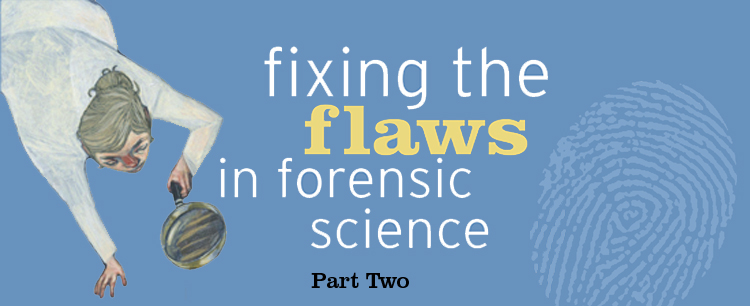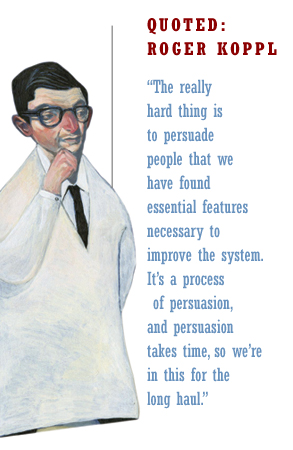

The nation is facing a shortage of nurses, coupled with an increased demand for health care. Find out how FDU is addressing the challenge.
The Campaign for Fairleigh Dickinson University is nearing its $50-million goal.
FDU’s Institute for Forensic Science Administration is applying the principles of economics and business to examine flaws in forensic science.
Ramatu Musa, BA’09 (T), interned at the U.S. Mission to the United Nations in Geneva, Switzerland. FDU Magazine shares her summer travelogue.
Pollster John Zogby has declared America’s youth to be the first global generation. Are they? FDU’s experts comment.Alumni Profile
Clean Power Cells
Gerald DeCuollo,
BS’77 (M)Alumni Profile
Glass Ceiling to Crown Heights
Rosemary Espanol,
BA’70 (M)

lawed forensic science is a serious problem, and FDU researchers are doing something about it. At FDU’s Institute for Forensic Science Administration (IFSA), which is a part of the Silberman College of Business, we are applying the tools of business administration to problems in forensic science, and we are investigating ways to improve forensic science by improving its organization.
In particular, at IFSA we are focusing on something the NAS report missed. Our researchers looked at things from the point of view of business disciplines, such as economics and management. Forensic science today, we discovered, is characterized by a twofold monopoly. (In economics, a monopoly can lead to increased prices, corruption, greater inefficiency and reduced innovation.) First, evidence is typically examined by one crime lab only, in a sense giving that lab a monopoly on examination of that evidence. Second, that same lab will normally be the only one to offer an interpretation of the results of the examination it performs. No other experts will be asked to judge what the evidence means.
Taking a businesslike approach toward this twofold monopoly, we propose the following measures to help prevent forensic-science errors:
• Random, independent, multiple examinations;
• Defense right to forensic-science expertise; and
• Sequential unmasking.
The first aspect, the monopoly in examinations, may allow errors — and even fraud — to go undetected. Just think of the falsification of evidence by Fred Zain. Random, independent, multiple examinations of evidence would reduce what the NAS report calls “both intentional and un- intentional laboratory errors.” Sometimes evidence should be sent to more than one lab to see whether their analyses are consistent. Such redundancy would help us prevent, detect and correct errors in forensic-science testing.
The problems at Houston’s crime lab were exposed only after years of sloppy and negligent work by that lab. How many errors were made in that time? And how many will go undetected forever? Independent testing of some of the evidence going to that lab might have exposed Houston’s systematic failures much earlier and kept Josiah Sutton out of jail.
An experimental study conducted by IFSA and funded by the National Science Foundation suggests that when extra tests are called for, the evidence should be sent to three separate labs. Not enough errors will be detected when only two labs examine the evidence. Increasing redundancy beyond three independent labs, however, does not further improve the system’s performance.
Supported by Earhart Foundation, IFSA is now using FDU’s Florham Laboratory for Experimental Social Science (FLESS) to extend these experiments in new directions. In particular, the Institute is now using real DNA evidence gathered from suspects and crime scenes.
The second aspect of the twofold monopoly, the monopoly on interpretations, may allow false interpretations to go unchallenged and alternative hypotheses to go unexamined. We argue that a substantive defense right to forensic-science expertise would reduce erroneous interpretations of forensic evidence, as well as false and misleading forensic-science testimony.
Experts on each side might be biased, however, the “strongly opposed” interests of the two sides would both be represented. Any facts or arguments left unrevealed would tend to favor one side or the other, and the favored side would have an incentive to reveal the information. In spite of each side’s biased desire to construe things in its favor, the “battle of the experts” tends to cause all relevant considerations to be revealed in court.
In the famous Gideon v. Wainwright case of 1963, the Supreme Court recognized that our Sixth Amendment right to a fair trial includes the right to legal counsel. Today, we have no similar right to forensic expertise, though forensic scientists are often more important to case outcomes than defense lawyers. When crime labs work for the prosecution and a defendant has no scientist to help him, the process lacks fundamental fairness.

Monopoly is not conducive to science. Scientific research is all about replication and rival interpretations. The anti-monopoly measures we have proposed would create replication and rival interpretations in forensic science, thus causing it more perfectly to resemble research science.

FSA helped develop the idea of “sequential unmasking” to reduce the risks of bias and error in forensics. It is not widely appreciated how much subjective judgment enters forensic-science testing. Even DNA evidence is often subject to multiple interpretations and subjective judgment. This may happen when the DNA of criminals and their victims are mixed together, a frequent occurrence. In such cases, DNA analysts typically have a suspect’s DNA profile in front of them to help sort out the evidence “correctly.” In other words, they go into the test with a cheat sheet, sort of like a criminal lineup in which a potential witness is told, “Number four is our suspect, does he look familiar?”
Sequential unmasking would take away the cheat sheet. Forensic scientists would be shielded from as much information about the criminal case as possible for as long as possible. For example, they should not know whether the suspect has a criminal record, and they should examine and characterize crime-scene DNA before comparing that evidence to the genetic information of a police suspect.
Sequential unmasking would put more science into forensic science. In most crime labs today there is a suspect and the evidence — and forensic scientists are asked to link the two together. Forensic scientists usually get all sorts of information about the cases they work on, such as the criminal history of the leading police suspect. Such facts are often irrelevant to the scientific analyses crime labs perform and actually can introduce bias. Forensic examination shouldn’t be this way. In other areas of science, “blinding” procedures are commonly used. The “right” answer is hidden to prevent the scientist from inadvertently seeing what they want to see, instead of seeing the truth. Double-blind “placebo” studies (studies in which both the researchers and subjects are unaware which group is using the real substance being tested) are a leading example of this precaution.
Of all these measures, creating a defense right to forensic science expertise might in fact be the best place to start. Such a right would create the kind of checks and balances that will eventually improve all aspects of forensic science. In most criminal cases one side or the other will want the forensic evidence reviewed. That side will have an incentive to document forensic science’s current shortcomings and bring them to the attention of the court whenever it is strategically appropriate. Slowly, case by case, the system will improve.
Finally, in these tough economic times, it is worth noting that fixing forensic science is not only the right thing to do, but also a way to save taxpayer money. Our research shows that improving forensic science would reduce the taxpayer cost of the criminal justice system. Extra forensic examinations are cheaper than the cost of forensic-science errors, particularly considering the cost of things like wrongful incarceration, repeated appeals and other legal expenses and liabilities, not to mention the social costs associated with unjust convictions. We can afford to fix forensics. We can’t afford not to.
FDU Magazine is published twice yearly by the Office of Communications and Marketing, Fairleigh Dickinson University, 1000 River Road, H-DH3-14, Teaneck, N.J. 07666.
FDU Magazine welcomes your comments. E-mail Rebecca Maxon, editor, at maxon@fdu.edu or make a blog entry at MyFDU.net.
J. Michael Adams, President; Richard Reiss, Senior Vice President for University Advancement; Angelo Carfagna, Assistant Vice President for University Advancement and Communication; Okang McBride, Director of Alumni Relations; Carol Kuzen Black, Director of Publications/Senior Editor; Rebecca Maxon, Editor and Web Designer; Nina Ovryn, Art Director
Contributors: Mary Ann Bautista, Roger Koppl, Andrew McKay, Ramatu Musa, Tom Nugent, Melissa Payton
Photo/Illustration Credits: John S. Dykes, Don Hamerman, istockphotos.com, Shelley Kusnetz, Weaver Lilley, Katharine Marks, Arthur Petrosemolo, Nick Romanenko, Danny Schwartz, Adena Stevens
For a print copy of FDU Magazine, featuring these and other stories, contact Rebecca Maxon, editor, at maxon@fdu.edu.
To update your address e-mail fine@fdu.edu or update your profile online at www.MyFDU.net.
©Copyright 2010 Fairleigh Dickinson University. All rights reserved.




